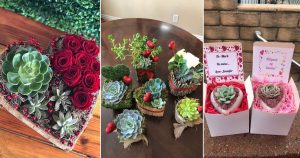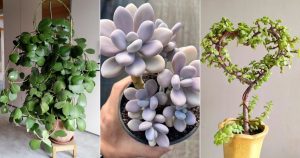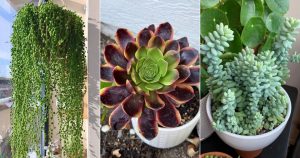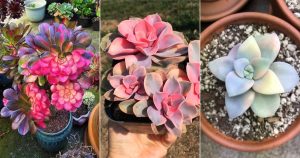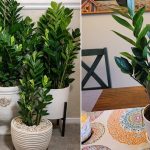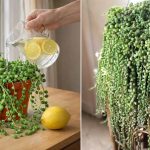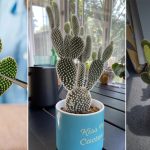For those who are fans of Hanging Succulents and adore their fleshy foliage cascading view, then we have got you covered!
Here, you will find succulents in different textures and forms, with varied flower shapes and colors, that look aesthetically pleasing when planted in hanging planters! We will also know what things you should keep in your mind while caring for these succulents in the end so, grab the most fitting option for your area.
Best Hanging Succulents
1. String of Hearts
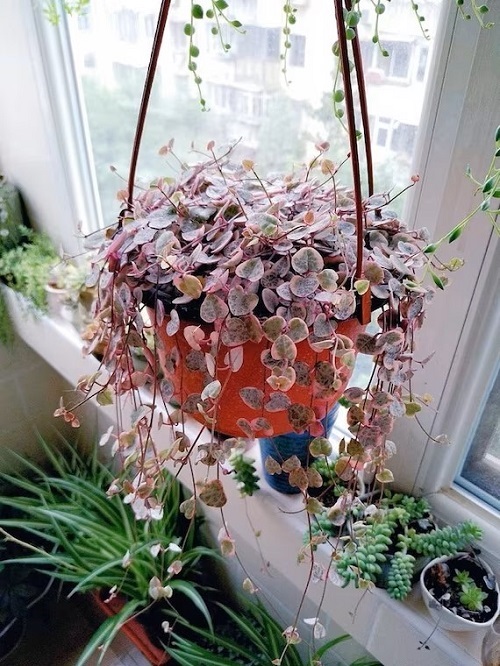
Botanical Name: Ceropegia woodii
This Chain of Hearts with tiny, evergreen trailing stems in hanging baskets displays appealing beauty. When exposed to sufficient light, it can vine down up to 12 inches long. But make sure that you give it indirect sunlight to avoid sunburn.
2. String of Nickels
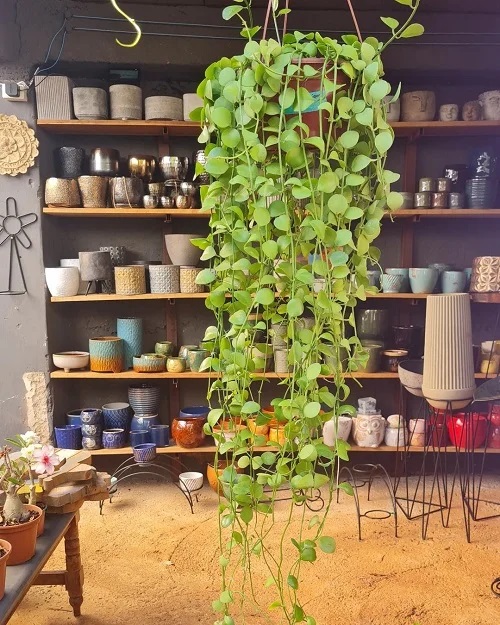
Botanical Name: Dischidia nummularia
It’s often called the ‘coin plant’ for obvious reasons! This vining succulent is known for its small, round, coin-like leaves that trail down from the mounted display. This is what the picture says. Look above! It can grow up to 8-10 feet in length.
3. String of Pearls
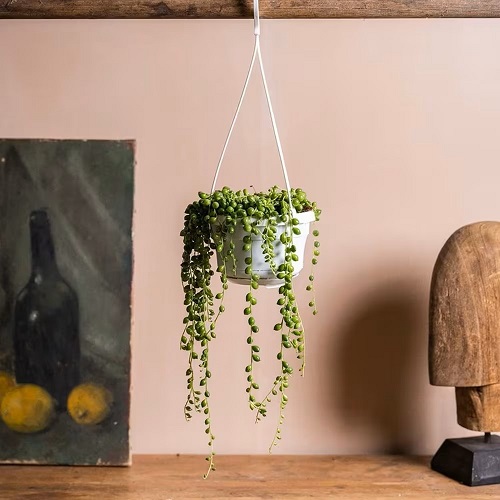
Botanical Name: Curio rowleyanus
A String of Pearls needs a mix of direct and indirect sun exposure to continue the life of its trailing stems and small green pea-shaped leaves. They look graceful when hanging down from the edges of a hanging basket.
Caution: Overwatering can make these pearls pop in a bad way.
4. Trailing Jade
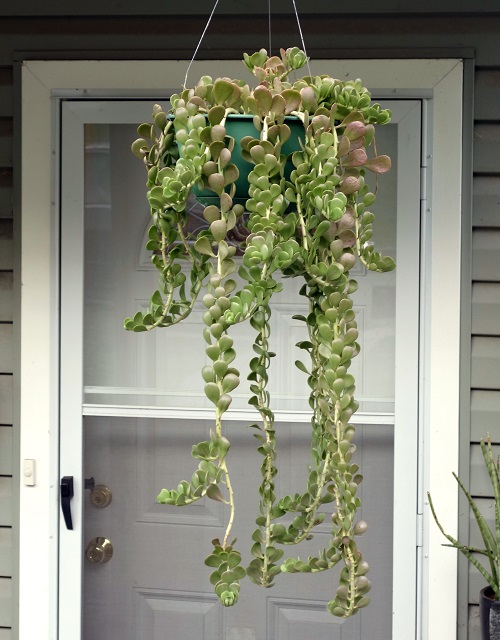
Botanical Name: Senecio jacobsenii
Trailing Jade is native to South Africa. It looks similar to crassula ovata, but it’s not a jade plant. It is an eye-catching succulent popular for its long, trailing stems adorned with fleshy, oval leaves. Unlike other succulents, Trailing Jade prefers partial shade and does well in a location that receives filtered light.
5. String of Buttons
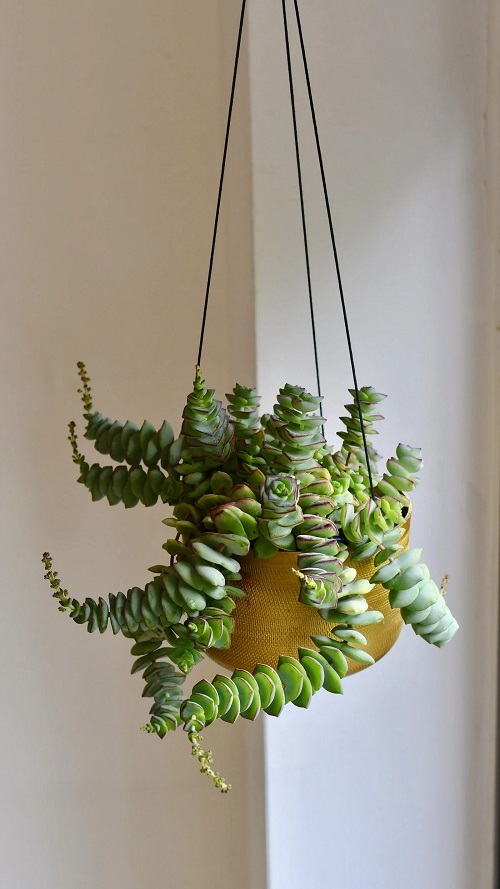
Botanical Name: Crassula perforata
It is a fast-growing, shrubby succulent whose leaves and stems are stacked with each other and, with time, droop downwards, making it a nice choice for hanging baskets or containers. String of Buttons is also drought-tolerant, requiring less watering, which makes it an excellent low-maintenance option for busy gardeners.
6. Little Pickles
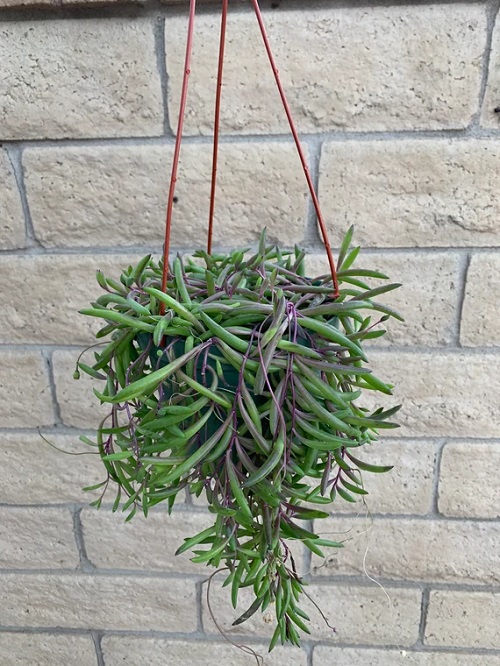
Botanical Name: Othonna capensis
Little Pickle is a slow-growing succulent cultivated by gardeners for its trailing, mat-forming habits, which make it well suited for hanging baskets and groundcovers. This succulent look-like green beans and it prefers cooler climates, so don’t let them fry in direct heat!
7. Baby Sun Rose
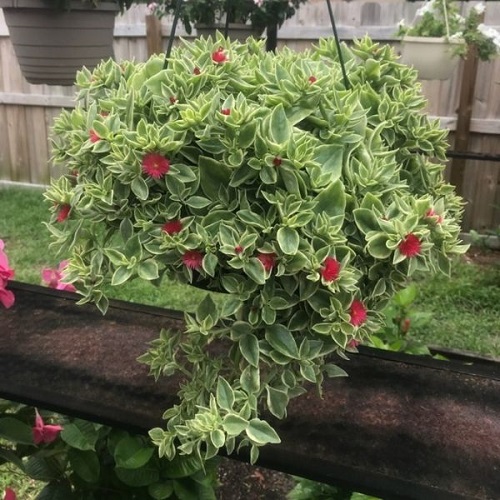
Botanical Name: Mesembryanthemum cordifolium
Baby Sun Rose is also known as Heartleaf Ice plant and it’s a magnet for butterflies!. This sprawling succulent forms a dense that develops in clumps with pale green and white foliage adorned with pink and red flowers.
8. Echeveria prolifica
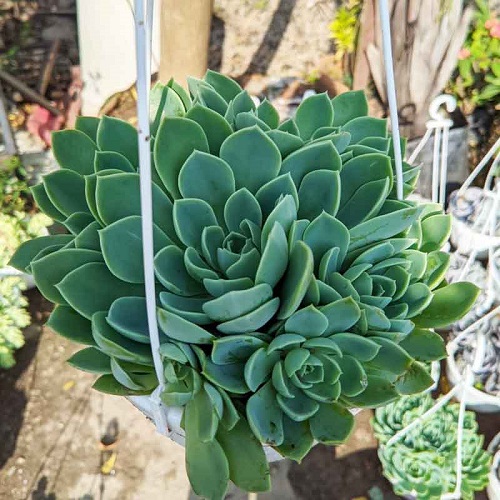
Botanical Name: Echeveria prolifica
It is a spreading succulent with rosettes of silvery green leaves. In spring, it produces clusters of tiny yellow flowers. The only thing you make sure that you handle it with care as their leaves are delicate.
9. Hindu Rope Plant
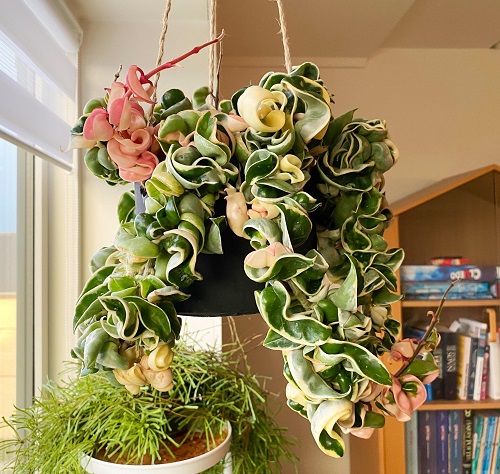
Botanical Name: Hoya carnosa compacta
Hindu Rope Plant is a semi-succulent plant for hanging pots because of its beautiful pink inflorescences and folded, curled, deep green leaves, which look like ropes when they trail down.
Note: Patience is key as they can be slow growers.
10. Donkey’s Tail
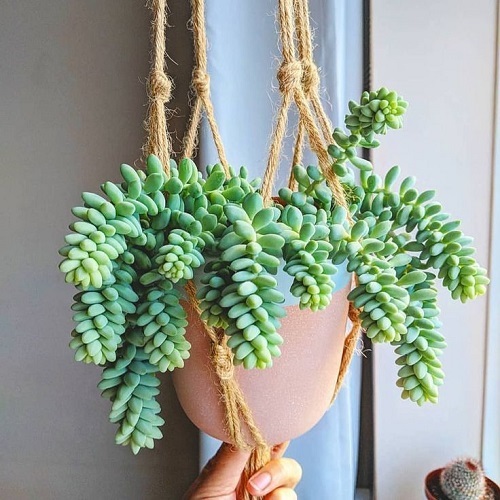
Botanical Name: Sedum morganianum
It is a succulent whose looks are highlighted by its dangling stems and triangular-shaped fleshy leaves. For this partial sun exposure, dry soil, fresh air, and a shallow pot would be enough! Keep it on your windowsill!
11. String of Bananas
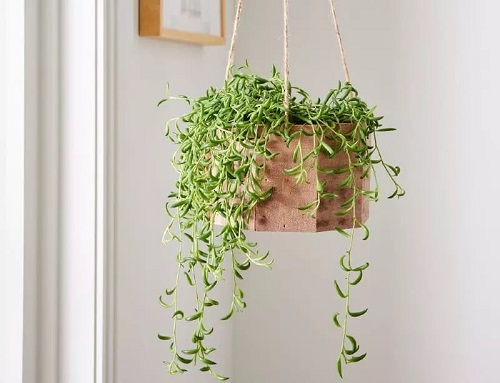
Botanical Name: Curio radicans
This drought-tolerant, easy-to-care succulent thrives well in a sunny location. Its glossy, banana-shaped leaves make it an ideal hanging houseplant.
12. October Daphne
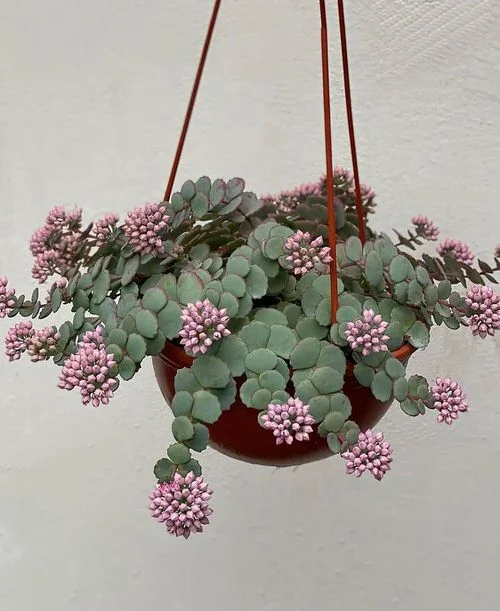
Botanical Name: Sedum sieboldii
This pretty succulent is prized for its drought tolerance and graceful display offered by its blue-green leaves when grown in hanging baskets.
13. Calico Kitten
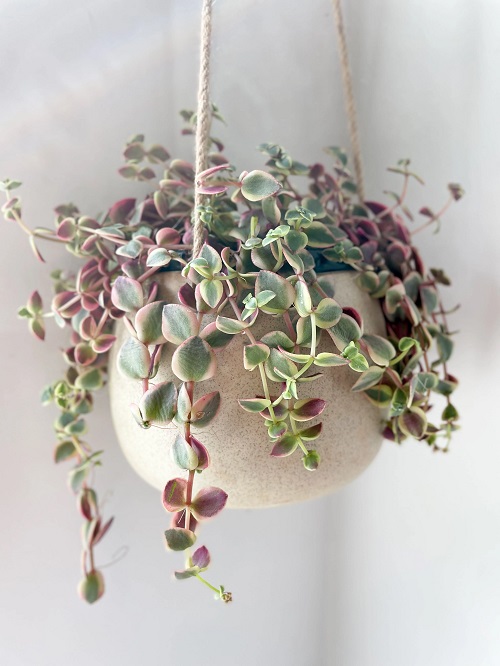
Botanical Name: Crassula pellucida subsp. marginalis ‘Variegata’
This ornamental variant is preferred due to its rose-pink heart-shaped leaves that fall down from the hanging baskets and look incredibly cute.
14. Little Missy Sedum
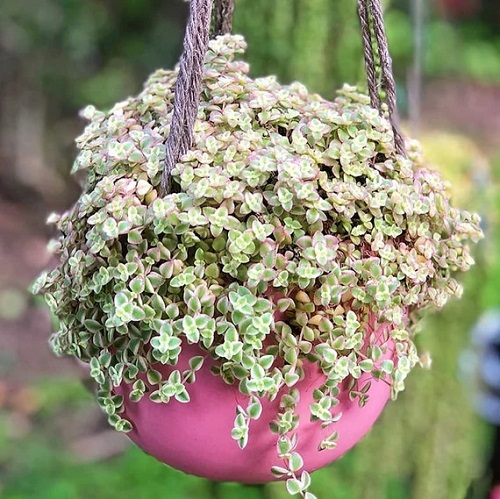
Botanical Name: Sedum ‘Little Missy’
It is an indoor hanging plant that grows well in cooler temperatures above 25°C. Little Missy Sedum has gray-green leaves arranged in rosettes.
15. Rat Tail Cactus
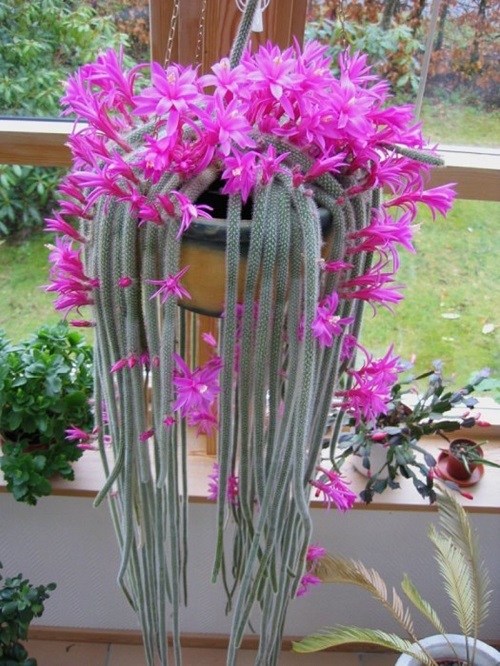
Botanical Name: Disocactus flagelliformis
Rat tail cactus is an attractive cactus with thick, drooping stems attached to clusters of bristle-like spines. It can grow up to 7 feet long. Plus, handle this plant with care as those bristles can be prickly!
16. Livingstone Daisy
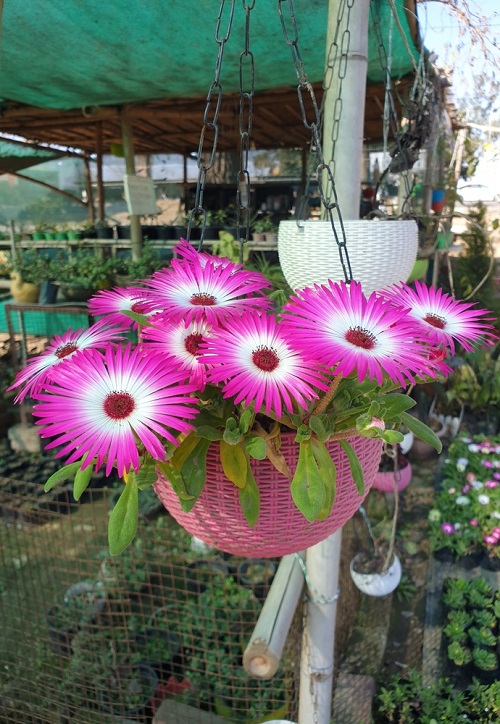
Botanical Name: Dorotheanthus bellidiformis
Livingstone Daisy is a winter-hardy succulent that thrives well in USDA zones 9-10 and prefers full sunlight. Its flowers open during the day and look stunning in spring.
17. String of Beads
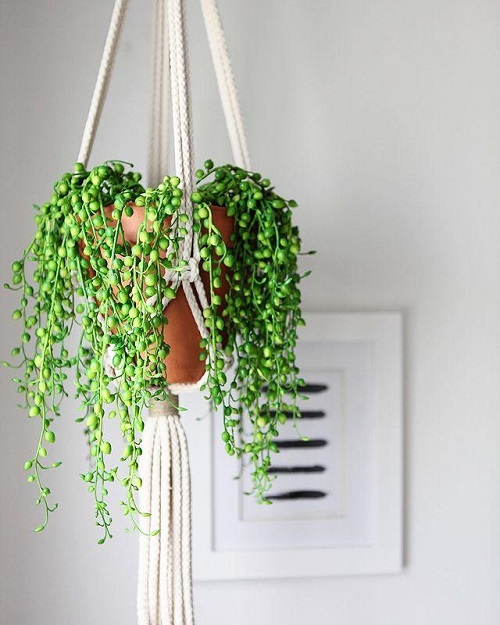
Botanical Name: Senecio rowleyanus
String of Beads is a leafy succulent vine native to dry regions of southwest Africa. Its stems trail from the container it’s grown with its pearl-like plumped leaves and becomes dense with the course of time!
18. Peanut Cactus
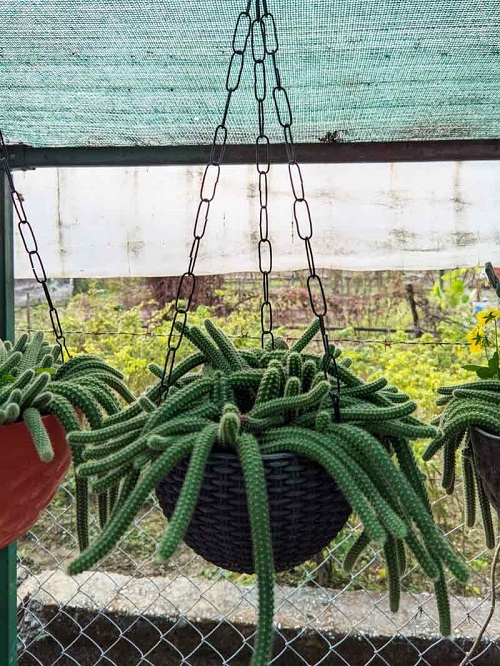
Botanical Name: Echinopsis chamaecereus
This cactus has sprawling, pale green stems covered with small white bristles, making it perfect for hanging planters and containers. Also, show off funnel shaped red flowers in late spring and early summer.
19. Monkey’s Tail
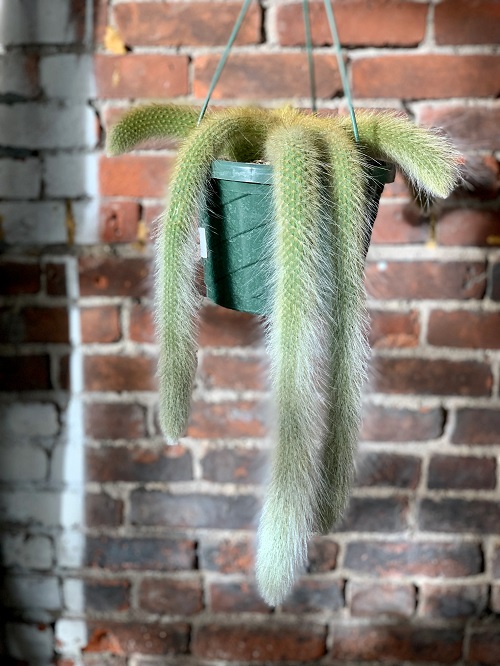
Botanical Name: Hildewintera colademononis
This succulent is native to Bolivia. It is an epilithic plant with long white, hairlike spines that appear similar to monkey’s tail, like what its name is!
20. Tessa Kalanchoe
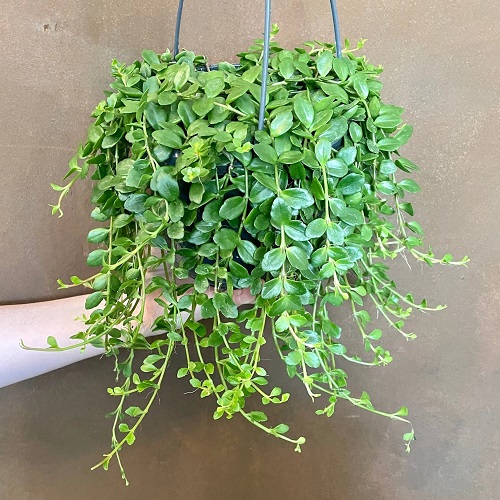
Botanical Name: Kalanchoe ‘Tessa’
This succulent features pendulous stems, fleshy green leaves, and bell-shaped flowers on the arching branches. Tessa Kalanchoe attracts many pollinators as well.
21. Fishbone Cactus
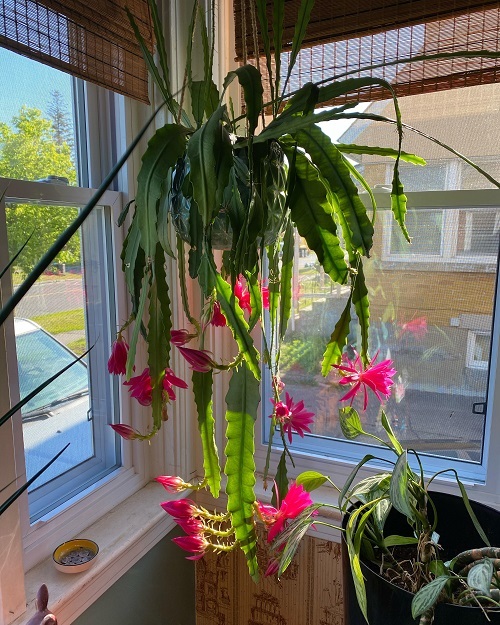
Botanical Name: Epiphyllum anguliger
This epiphytic cactus with green leaves in a zigzag pattern and creamy white-pink flowers looks appealing when displayed in hanging pots.
22. Medusa’s Head
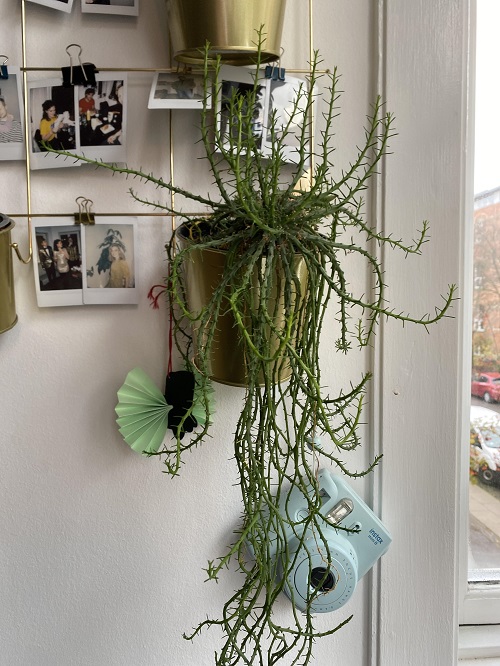
Botanical Name: Euphorbia caput-medusae
This one is from South Africa’s west coast and earns its name from its resemblance to the mythological figure Medusa, whose hair was made of snakes. Medusa’s Head has gray-green snake-like cylindrical arms, which gives it an unusual, scary shape. This succulent is look-like brain and also boasts medicinal properties. It is worth adding to your collection!
23. Fish Hooks
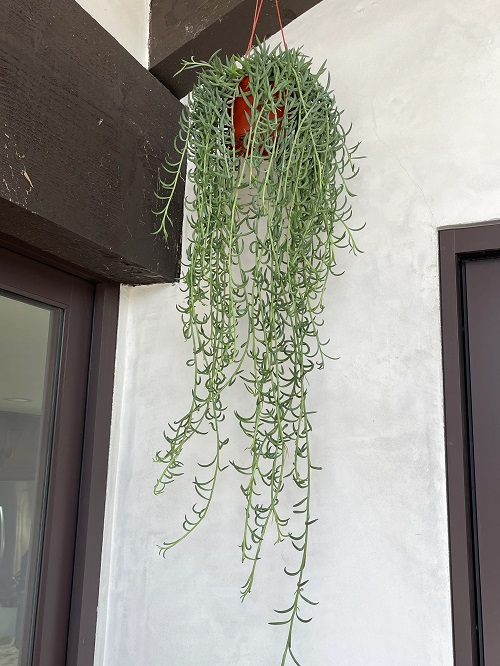
Botanical Name: Senecio ‘Fish Hooks’
The Fish Hooks is not only one of the best indoor hanging succulents, but their compact size allows you to keep them on your study table or shelves as well. It shows off tube-like foliage.
24. Ghost Plant
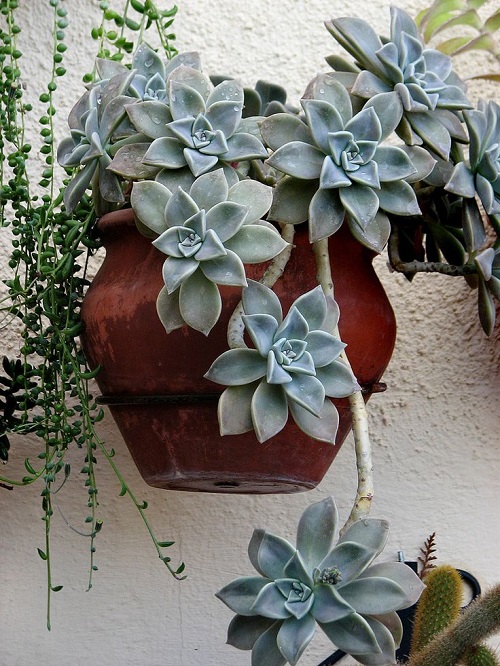
Botanical Name: Graptopetalum paraguayense
This is a very attractive hanging plant due to its semi-evergreen foliage, which becomes pinkish-yellow in summer and bluish-gray in partial shade. These color changes are due to the plant’s ability to produce anthocyanins, pigments that protect it from UV light.
25. Dutchman Pipe Cactus
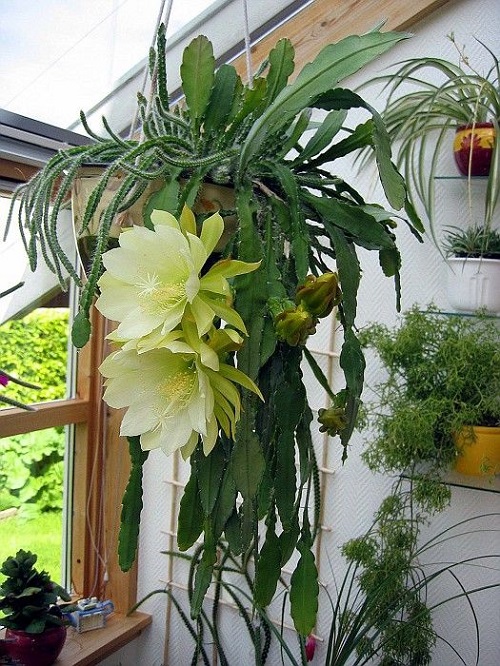
Botanical Name: Epiphyllum oxypetalum
Dutchman Pipe Cactus is a fast-growing, long-lived, sweetly scented succulent that can grow up to 10 feet high. You decide how you want to train it to grow.
26. String of Dolphins
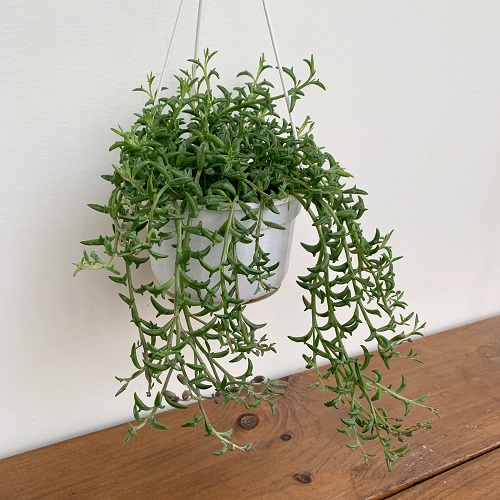
Botanical Name: Curio × peregrinus
Also known as dolphin necklace because of its leaves, which look like mini dolphins jumping out of the waves. It has puffball-like blooms, and it looks great in hanging baskets.
27. Elephant Bush
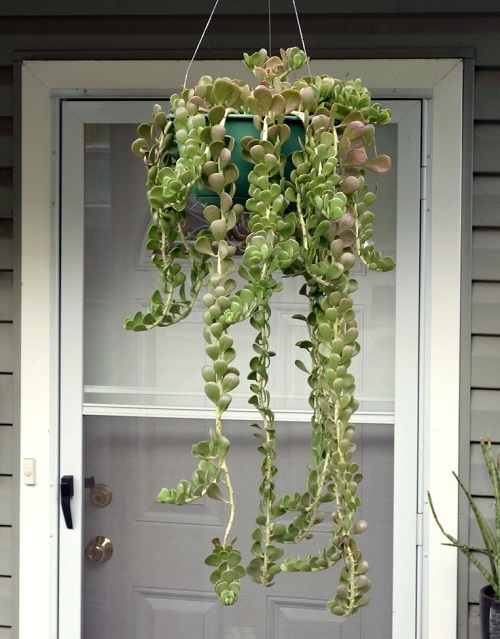
Botanical Name: Portulacaria afra
The Elephant Bush is a shrub from South Africa that is famous for its trailing beauty due to its variegated leaves. This low-maintenance houseplant is easy to grow.
28. Ruby Necklace
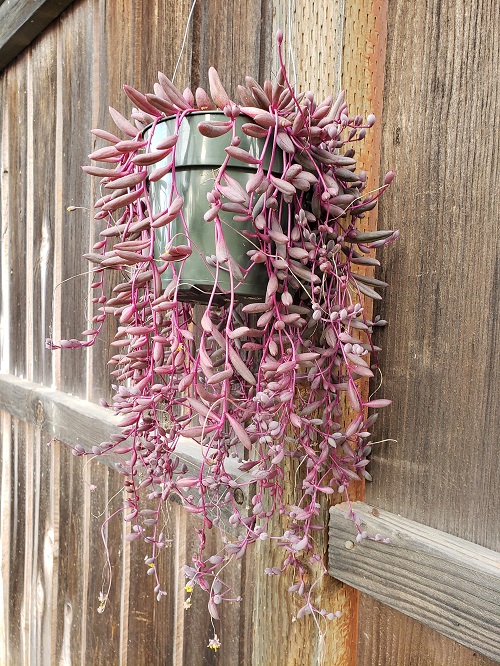
Botanical Name: Othonna capensis
Ruby Necklace is an eye-catching succulent with contrasting foliage, thin red-purple stems, and bright green leans, which turn ruby red in excess sunlight.
29. Linearis Hoya
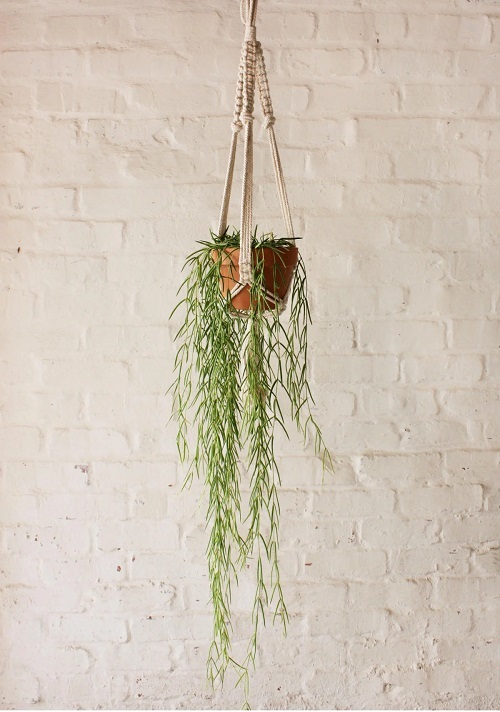
Botanical Name: Hoya linearis
Linearis Hoya is a succulent that offers beauty and resilience. Its trailing stems, hairy leaves, and clusters of blooms look good hanging from a bright window.
30. Dancing Bone
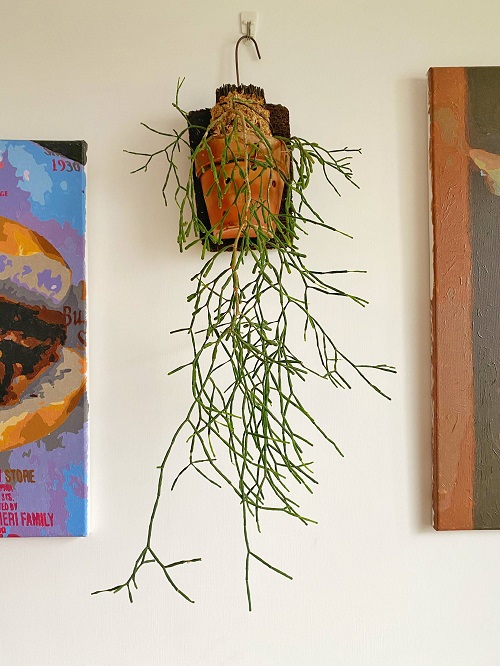
Botanical Name: Hatiora salicornioides
Dancing Bone cactus wins the gardener’s heart with its shrubby appearance in a basket. It grows quickly and produces yellow flowers in early spring.
31. Mistletoe Cactus
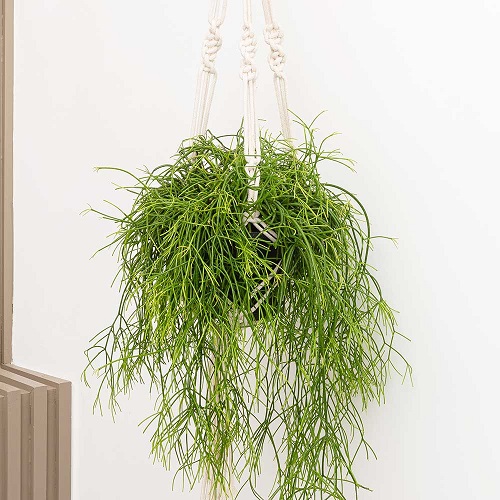
Botanical Name: Rhipsalis baccifera
This epiphytic succulent, with its long drooping, requires well-drained soil, dappled sunlight, and a bit of water regularly to grow well in hanging baskets.
32. Cliff Cotyledon
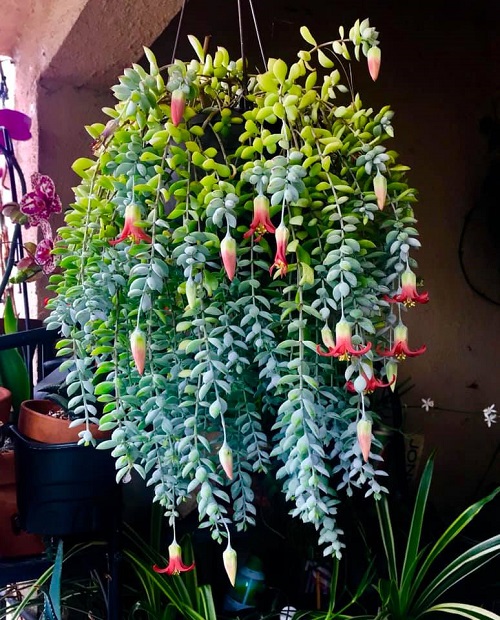
Botanical Name: Cotyledon pendens
Cliff Cotyledon is a succulent with many branches, densely crowded with teardrop-shaped leaves and pink-red blooms. It looks stunning when hanging from the patio or balcony!
33. String of Turtle
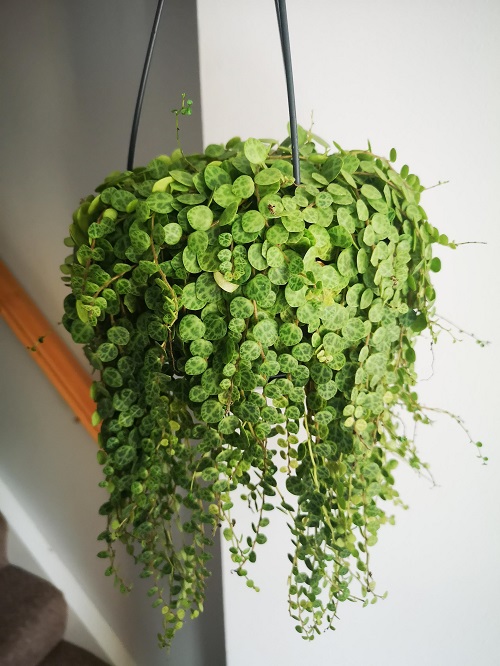
Botanical Name: Peperomia prostrata
String of Turtle is a charming vining succulent that needs light to reach all its parts; otherwise, it will stop producing new growth and soon will lose its dangling-down look!
34. Burro’s Tail
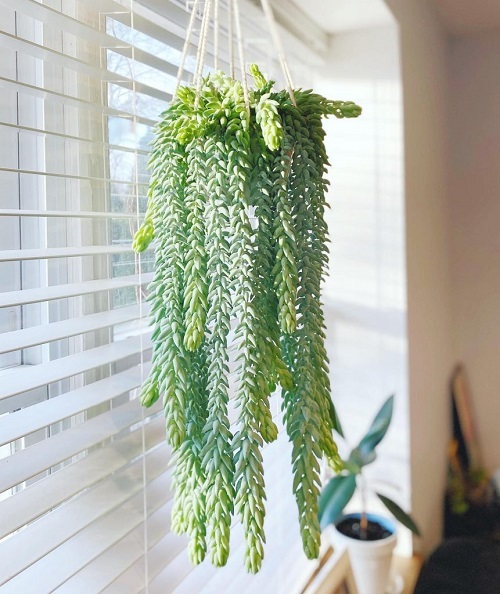
Botanical Name: Sedum burrito
Burro’s Tail succulent is from the stonecrop family and features rounded leaves tightly growing along their stems. Hang it where it receives plenty of sunlight!
35. Jade Necklace
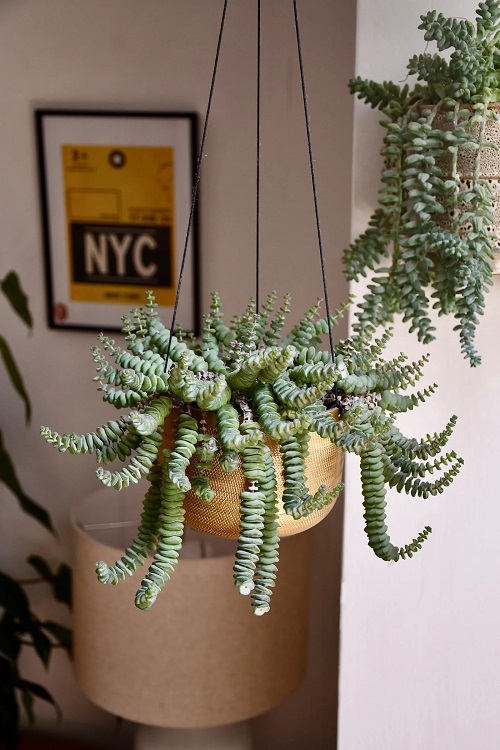
Botanical Name: Crassula marnieriana
It is a slow-growing crassula with trailing stems and tightly packed leaves, which makes it look like a necklace that earned its name. It thrives in USDA zones 9b-11b.
36. Christmas Cactus
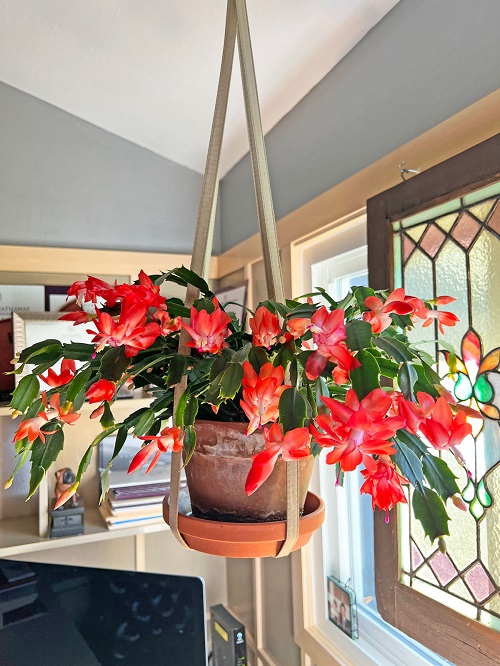
Botanical Name: Schlumbergera russelliana
Christmas Cactus’s long stems trail down from the hanging basket, and as it matures, it grows larger, multiplying its beauty with time.
37. Queen of the Night
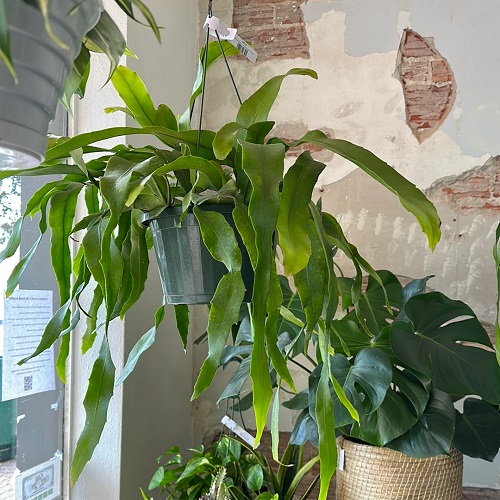
Botanical Name: Epiphyllum oxypetalum
It is a night-blooming, epiphyte to lithophyte plant. In its natural habitat, it grows on trees, but you can safely grow it in hanging baskets in partial shade with bright indirect light!
How to Take Care of Succulents
When you are growing these low-maintenance succulents in hanging containers then, you must make sure about these things like you can use terracotta or ceramic pots to absorb excess water and prevent root rot. The container should have enough space for roots to grow well and proper drainage holes.
The best soil for these plants is a succulent and cacti potting mix; regular soil retains too much moisture. Succulents like morning sun and afternoon shade, so a south-facing window indoors is ideal. If outdoors, find a spot that meets these conditions. Water only when the soil is completely dry, and reduce watering in winter and during the plant’s dormant phase.
They prefer moderate temperatures, so keep them away from freezing temperatures and extreme heat. A 10-10-10 fertilizer is sufficient during the growing season. You should also keep an eye out for pests like aphids and spider mites, and treat with neem oil if needed. Prune dead or damaged parts to improve appearance and health. Repot annually or when they outgrow their container with new soil to remove harmful salts and dirt.
We hope you enjoyed this tour of the best hanging succulents! What’s your favorite plant from this list? Which one are you excited to grow next? Share your experiences, tips, and favorite picks in the comments below. Let’s grow a beautiful, hanging garden together!

